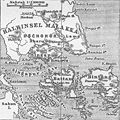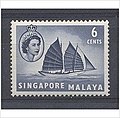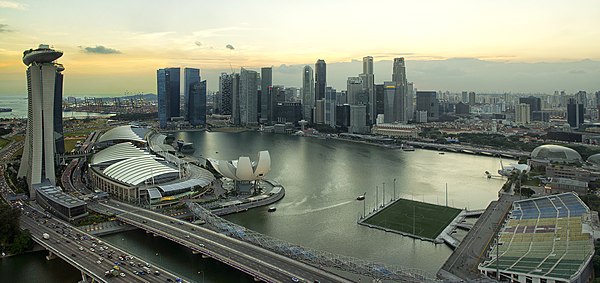Portal:Singapore
 Map of Singapore Singapore, officially the Republic of Singapore, is an island country and city-state in maritime Southeast Asia. The country's territory comprises one main island, 63 satellite islands and islets, and one outlying islet. It is about one degree of latitude (137 kilometres or 85 miles) north of the equator, off the southern tip of the Malay Peninsula, bordering the Strait of Malacca to the west, the Singapore Strait to the south along with the Riau Islands in Indonesia, the South China Sea to the east, and the Straits of Johor along with the State of Johor in Malaysia to the north.
Singapore's history dates back at least eight hundred years, having been a maritime emporium known as Temasek and subsequently a major constituent part of several successive thalassocratic empires. Its contemporary era began in 1819, when Stamford Raffles established Singapore as an entrepôt trading post of the British Empire. In 1867, Singapore came under the direct control of Britain as part of the Straits Settlements. During World War II, Singapore was occupied by Japan in 1942 and returned to British control as a separate Crown colony following Japan's surrender in 1945. Singapore gained self-governance in 1959 and, in 1963, became part of the new federation of Malaysia, alongside Malaya, North Borneo, and Sarawak. Ideological differences led to Singapore's expulsion from the federation two years later; Singapore became an independent sovereign country in 1965. After early years of turbulence and despite lacking natural resources and a hinterland, the nation rapidly developed to become one of the Four Asian Tigers. As a highly developed country, it has one of the highest GDP per capita (PPP) in the world. It is also identified as a tax haven. Singapore is the only country in Asia with a AAA sovereign credit rating from all major rating agencies. It is a major aviation, financial, and maritime shipping hub and has consistently been ranked as one of the most expensive cities to live in for expatriates and foreign workers. Singapore ranks highly in key social indicators: education, healthcare, quality of life, personal safety, infrastructure, and housing, with a home-ownership rate of 88 percent. Singaporeans enjoy one of the longest life expectancies, fastest Internet connection speeds, lowest infant mortality rates, and lowest levels of corruption in the world. It has the third highest population density of any country in the world, although there are numerous green and recreational spaces as a result of urban planning. With a multicultural population and in recognition of the cultural identities of the major ethnic groups within the nation, Singapore has four official languages: English, Malay, Mandarin, and Tamil. English is the common language, with exclusive use in numerous public services. Multi-racialism is enshrined in the constitution and continues to shape national policies in education, housing, and politics. Singapore is a parliamentary republic in the Westminster tradition of unicameral parliamentary government, and its legal system is based on common law. While the country is de jure a multi-party democracy with free elections, the government under the People's Action Party (PAP) wields widespread control and political dominance. The PAP has governed the country continuously since full internal self-government was achieved in 1959, and holds a supermajority in Parliament. One of the five founding members of ASEAN, Singapore is also the headquarters of the Asia-Pacific Economic Cooperation Secretariat, the Pacific Economic Cooperation Council Secretariat, and is the host city of many international conferences and events. Singapore is also a member of the United Nations, the World Trade Organization, the East Asia Summit, the Non-Aligned Movement, and the Commonwealth of Nations. (Full article...)Selected article - Fort Pasir Panjang or Labrador Battery is located within Labrador Park at the southern tip of Singapore island. It was one of the 11 coastal artillery forts built by the British in the 19th century to defend the western passageway into Keppel Harbour against piracy and foreign naval powers. During the 1942 Battle of Pasir Panjang, the fort played a supporting role but a limited one in defending the Malay Regiments against the Japanese invasion at Bukit Chandu. In 1995, the site was gazetted by the National Heritage Board as one of the 11 World War II sites in Singapore. (Full article...) Selected picture The Esplanade Bridge is a 260 metres long road bridge that spans across the mouth of the Singapore River in Singapore with the Esplanade - Theatres on the Bay on its northern abutment and the Merlion on the southern. Read more... General imagesThe following are images from various Singapore-related articles on Wikipedia.
Selected biography -Lee Choon Seng (Chinese: 李俊承; pinyin: Lǐ Jùnchéng; Pe̍h-ōe-jī: Lí Tsùn-sîng; 1888—5 June 1966) was a businessman and philanthropist in pre-independence Singapore. He founded several companies, cultivated rubber plantations in Malaya and started Chinese banks in the region. Lee held leadership roles in several Chinese community organisations in Singapore, notably the Singapore Chinese Chamber of Commerce and Industry (SCCCI), and supported Sun Yat-Sen's revolutionary cause in China. In addition, he promoted the growth of Buddhism in Singapore by setting up several Buddhist institutions, including the Singapore Buddhist Lodge, Singapore Buddhist Federation and Poh Ern Shih Temple. In 2008, his life and contributions to society were commemorated in a memorial hall at the Ee Hoe Hean Club. (Full article...) Did you know (auto-generated)
In this month
More did you know -
Related portalsSoutheast Asia Other Countries Tasks
CategoriesWikiprojectsAssociated WikimediaThe following Wikimedia Foundation sister projects provide more on this subject:
Discover Wikipedia using portals |






























































